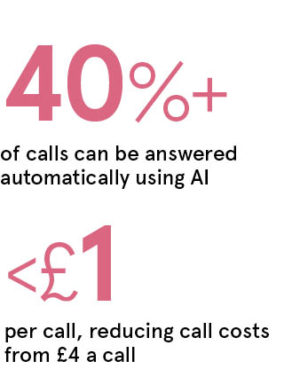
NHS Business Services Authority (BSA), providers of the European health insurance cards which enable UK residents to get free treatment in other countries, are piloting a service called Arcus Answer. So far, they have found that the technology can respond to 40 per cent of their calls with dramatic cost savings.
Darren Curry, chief digital officer at NHS BSA, says: “We implemented this in four weeks. Soon, over 40 per cent of all the calls we received were being dealt with by this system. It enables our contact centre operators to speak to users who need more support or have complex queries, giving people an increased quality of service.” The pilot service is now live and the BSA is considering implementing the technology more widely.
NHS BSA is based in Newcastle, home of Stephenson’s Rocket, the steam engine that became a symbol of the Industrial Revolution. Like artificial intelligence (AI), early locomotives inspired both awe and fear, but ultimately reduced travel costs dramatically. Arcus Answer is set to do the same for customer service. The average cost of a call in a UK contact centre is nearly £4, but the cost of an Arcus Answer service is less than £1.
So why does this matter to local authorities?
Local authorities have to offer good customer service on everything from parking and housing to recycling, waste services and severe weather response. As a result, every local authority has at least one call centre. Expensive to set up and run, staff turnover is often high. Nor are websites the solution; digital transactions often limited to filling out a form, residents who need help often come from groups that don’t have good access to the internet or are not comfortable using online.
Arcus Answer is more like talking to Amazon Echo (Alexa) than calling an automated service. Hold music is replaced by an instant answer; the service deals equitably with angry cit-izens and can be relied on to give the same answers to the same questions. If linked to back-end systems, these services can also process whole transactions, such as booking appointments, issuing parking permits or recording a missed bin collection.
Services are not limited to inbound calls. Councils are starting to consider using Arcus Answer to call hostels and care homes to find available beds, a daily task that takes an individual time, but which can be done much faster by AI that rings every hostel concurrently.
The answers can be managed via an online database.
Arcus Answer is more like talking to Amazon Echo (Alexa) than calling an automated service
Outbound calling is also useful in emergency situations such as flooding where a service can look up which postcodes are affected, call residents individually, find out what help they need or the emergency services at any time of the day or night.

In emergencies, AI can free up budget to spend on human care, for example by calling to arrange home visits.
Often the promise of new technology is lost in the pain of implementation, yet the NHS pilot took just four weeks.
Cambridge-based Arcus Global is now offering a four-week free trial to organisations with appropriate workloads. The pilot enables the buyer to see exactly how the service works before purchasing and it is ready to go live immediately afterwards.
Visibility comes through a portal that shows what people are asking the system and how many calls are being handled. In the NHS pilot, this revealed a significant proportion of callers wanted a service that no one had previously thought of.
As Newcastle continues to host innovative developments, the question that local authorities will be asking themselves is which of their services will be the first to follow in Stephenson’s footsteps, seize the opportunity for greater efficiency and adopt AI to streamline its customer service?
For more information please visit www.arcusglobal.com
